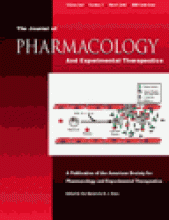Abstract
μ-Opioid agonists decrease cocaine self-administration in laboratory studies and cocaine use by many cocaine- and opioid-dependent polydrug abusers. To assess the role of μ-agonist efficacy as a determinant of these effects, this study evaluated cocaine- and food-maintained responding by rhesus monkeys (Macaca mulatta) during chronic treatment with saline or the high-efficacy μ-agonist fentanyl (0.001–0.01 mg/kg/h), the intermediate-efficacy μ-agonist morphine (0.032–0.32 mg/kg/h), or the low-efficacy μ-agonists nalbuphine (0.1–1.0 mg/kg/h) and butorphanol (0.0032–0.032 mg/kg/h). Responding was maintained by cocaine and food under a second order schedule of reinforcement during multiple daily sessions of cocaine and food availability. Saline and each opioid dose were administered continuously for 7 consecutive days during availability of each cocaine dose. All four μ-agonists produced dose-dependent and sustained decreases in cocaine self-administration across a range of cocaine doses (0.0032–0.1 mg/kg/injection). Nalbuphine and butorphanol produced the greatest decreases in cocaine self-administration and the smallest effects on food-maintained responding. Morphine and fentanyl produced smaller decreases in cocaine self-administration, and undesirable effects precluded evaluation of higher fentanyl and morphine doses. Decreases in cocaine self-administration produced by nalbuphine and butorphanol probably did not reflect a general blockade of cocaine's abuse-related effects, because nalbuphine and butorphanol did not block the discriminative stimulus effects of cocaine in monkeys trained to discriminate 0.4 mg/kg cocaine from saline in a food-reinforced drug discrimination procedure. These results suggest that low-efficacy μ-agonists may decrease cocaine self-administration to a greater degree and with fewer undesirable effects than high-efficacy μ-agonists.
Footnotes
-
This work was supported by Grants R01-DA02519, P50-DA04059, and K05-DA00101 from National Institute on Drug Abuse, National Institutes of Health.
- Abbreviations:
- VR
- variable ratio
- FR
- fixed ratio
- inj
- injection
- Received September 17, 2001.
- Accepted November 30, 2001.
- The American Society for Pharmacology and Experimental Therapeutics
JPET articles become freely available 12 months after publication, and remain freely available for 5 years.Non-open access articles that fall outside this five year window are available only to institutional subscribers and current ASPET members, or through the article purchase feature at the bottom of the page.
|






